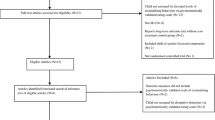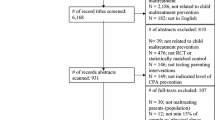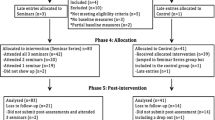Abstract
We systematically reviewed the evidence for the efficacy and effectiveness of brief parenting interventions, defined as <8 sessions in duration, in reducing child externalizing behaviors. While there is significant evidence to support the efficacy of parenting interventions of 8–12 sessions in duration, the public health benefit of these interventions is limited by low participation rates, high attrition rates and the lack of implementation by a wide range of practitioners. Brief parenting interventions have the potential to extend the reach and impact of parenting interventions and steer children away from a trajectory of life course persistent behavior problems. A search of four electronic databases was undertaken to identify RCTs conducted on brief parenting interventions. The primary outcome was child externalizing behaviors and secondary outcomes included parenting skills, parental self-efficacy, parental mental health and partner relationship functioning. The heterogeneity of included studies prevented a meta-analysis but characteristics of the studies were described. Nine papers summarising the results of eight studies with 836 families in five countries met inclusion criteria. All studies found significant improvements in parent-rated child externalizing behaviors, parenting skills and parenting self-efficacy, relative to control or comparison groups, with findings maintained at follow-up. Less consistent findings emerged for parental mental health and partner relationship functioning. This review provides initial evidence that brief parenting interventions may be sufficient to reduce child externalizing behavior problems for some families, however further research is needed.

Similar content being viewed by others
References
Axelrad, M. E., Butler, A. M., Dempsey, J., & Chapman, S. G. (2013). Treatment effectiveness of a brief behavioral intervention for preschool disruptive behavior. Journal of Clinical Psychology in Medical Settings, 30, 323–332.
Bower, P., & Gilbody, S. (2005). Stepped care in psychological therapies: Access, effectiveness and efficiency. Narrative literature review. The British Journal of Psychiatry, 186, 11–17.
Bradley, S. J., Jadaa, D. A., Brody, J., Landy, S., Tallett, S. E., Watson, W., et al. (2003). Brief psychoeducational parenting program: An evaluation and 1-year follow-up. Journal of the American Academy of Child and Adolescent Psychiatry, 42, 1171–1178.
Brauner, C. B., & Stephens, C. B. (2006). Estimating the prevalence of early childhood serious emotional/behavioral disorders: Challenges and recommendations. Public Health Reports. Special Report on Child Mental Health, 121, 303–310.
Chorpita, F., Daleiden, E. L., Ebesutani, C., Young, J., Becker, K. D., Nakamura, B. J., et al. (2011). Evidence-based treatments for children and adolescents: An updated review of indicators of efficacy and effectiveness. Clinical Psychology: Science and Practice, 18, 154–172.
Colman, I., Murray, J., Abbott, R. A., Maughan, B., Kuh, D., Croudace, T. J., & Jones, P. B. (2009). Outcomes of conduct problems in adolescence: 40 year follow-up of national cohort. British Medical Journal, 338, a2981. doi:10.1136/bmj.a2981.
de Graaf, I., Speetjens, P., Smit, F., de Wolff, M., & Tavecchio, L. (2008a). Effectiveness of the Triple P Positive Parenting Program on behavioural problems in children: A meta-analysis. Behavior Modification, 32, 714–735.
de Graaf, I., Speetjens, P., Smit, F., de Wolff, M., & Tavecchio, L. (2008b). Effectiveness of the Triple P Positive Parenting Program on Parenting: A meta-analysis. Family Relations, 57, 553–566.
Dishion, T. J., Connell, A., Weaver, C., Shaw, D., Gardner, F., & Wilson, M. (2008). The family check-up with high-risk indigent families: Preventing problem behavior by increasing parents’ positive behaviour support in early childhood. Child Development, 79, 1395–1414.
Dittman, C. K., Farrugia, S. P., Keown, L. J., & Sanders, M. R. (2015). Dealing with disobedience: An evaluation of a brief parenting intervention for young children showing noncompliant behavior problems. Child Psychiatry and Human Development,. doi:10.10007/s10578-015-0548-9.
Downs, S. H., & Black, N. (1998). The feasibility of creating a checklist for the assessment of the methodological quality both of randomised and non-randomised studies of health care interventions. Journal of Epidemiology and Community Health, 52, 377–384.
Eyberg, S., Boggs, S. R., & Algina, J. (1995). Parent–child interaction therapy: A psychosocial model for the treatment of young children with conduct problem behavior and their families. Psychopharmacology Bulletin, 31, 83–91.
Eyberg, S. M., Nelson, M. M., & Boggs, S. R. (2008). Evidence-based psychosocial treatments for children and adolescents with disruptive behavior. Journal of Clinical Child and Adolescent Psychology, 37, 218–237.
Eyberg, S. M., & Pincus, D. (1999). Eyberg child behavior inventory and Sutter–Eyberg student behavior inventory-revised: Professional manual. Odessa, FL: Psychological Assessment Resources.
Fergusson, D. M., Horwood, L. J., & Ridder, E. M. (2005). Show me the child at seven: The consequences of conduct problems in childhood for psychosocial functioning in adulthood. Journal of Child Psychology and Psychiatry and Allied Disciplines, 46, 837–849.
Fletcher, R., Freeman, E., & Matthey, S. (2011). The impact of behavioral parent training on fathers’ parenting: A meta-analysis of the Triple P-Positive Parenting Program. Fathering, 9, 291–312.
Furukawa, T. A., Noma, H., Caldwell, D. M., Honyashiki, M., Shinohara, K., Imai, H., et al. (2014). Waiting list may be a nocebo condition in psychotherapy trials: A contribution from network meta-analysis. Acta Psychiatrica Scandinavica, 130, 181–192.
Gardner, F., Connell, A., Trenacosta, C. J., Shaw, D., Dishion, T. J., & Wilson, W. N. (2009). Moderators of outcome in a brief family-centered intervention for prevention early problem behavior. Journal of Consulting and Clinical Psychology, 77, 543–553.
Glasgow, R. E., Vogt, T. M., & Boles, S. M. (1999). Evaluating the public health impact of health promotion interventions: The RE-AIM framework. American Journal of Public Health, 13, 1322–1327.
Haaga, D. A. F. (2000). Introduction ot the speical section on stepped-care models in psychotherapy. Journal of Consulting and Clinical Psychology, 68, 547–548.
Heinrichs, N., Bertram, H., Kuschel, A., & Hahlweg, K. (2005). Parent recruitment and retention in a universal prevention program for child behavior and emotional problems: Barriers to research and program participation. Prevention Science, 6, 275–286.
Houtrow, A. J., & Okumura, M. J. (2011). Pediatric mental health problems and associated burden on families. Vulnerable Children and Youth Studies, 6, 222–223.
Joachim, S., Sanders, M. R., & Turner, K. M. T. (2010). Reducing preschoolers’ disruptive behavior in public with a brief parent discussion group. Child Psychiatry and Human Development, 41, 47–60.
Kazdin, A. E. (1996). Dropping out of child psychotherapy: Issues for research and implications for practice. Clinical Child Psychology and Psychiatry, 1, 133–156.
Kazdin, A. (2005). Parent management training: Treatment for oppositional, aggressive and antisocial behaviour in children and adolescents. New York: Oxford University Press.
Kazdin, A. (2008). Evidence-based treatments and delivery of psychological services: Shifting our emphases to increase impact. Psychological Services, 5, 201–215.
Kazdin, A. E., & Wassell, G. (1999). Barriers to treatment participation and therapeutic change among children referred for conduct disorder. Journal of Clinical Child Psychology, 28, 160–172.
Kjøbli, J., & Bjørnebekk, G. (2013). A randomized effectiveness trial of brief parent training: Six-month follow-up. Research on Social Work Practice, 23, 603–612.
Kjøbli, J., & Odgen, T. (2012). A randomized effectiveness trial of brief parent training in primary care settings. Prevention Science, 13, 616–626.
Lavigne, J. V., LeBailly, S. A., Gouze, K. R., Cicchetti, C., Pochyly, J., Arend, R., et al. (2008). Treating oppositional defiant disorder in primary care: A comparison of three models. Journal of Pediatric Psychology, 33, 449–461.
Leijten, P., Dishion, T. J., Thomaes, S., Raaijmakers, M. A. J., de Castro, B. O., & Matthys, W. (2015). Bringing parenting interventions back to the future: How randomized microtrials may benefit parenting intervention efficacy. Clinical Psychology Science and Practice, 22, 47–57.
Meija, A., Calam, R., & Sanders, M. R. (2015). A pilot randomized controlled trial of a brief parenting intervention in low-resource setting in Panama. Prevention Science,. doi:10.1007/s11121-015-0551-1.
Morawska, A., Adamson, M., Hinchlifee, K., & Adams, T. (2014). Hassle free Mealtimes Triple P: A randomised controlled trial of a brief parenting group for childhood mealtime difficulties. Behaviour Research and Therapy, 53, 1–9.
Morawska, A., Haslam, D., Milne, D., & Sanders, M. R. (2011). Evaluation of a brief parenting discussion group for parents of young children. Journal of Developmental and Behavioral Pediatrics, 32, 136–145.
Nieuwsma, J. A., Trivedi, R. B., McDuffie, J., Kronish, I., Benjamin, D., Williams, J. W. (2011). Brief psychotherapy for depression in primary care: A systematic review of the evidence. VA-ESP Project #09-010.
Nowak, C., & Heinrichs, N. (2008). A comprehensive meta-analysis of Triple P-Positive Parenting Program using hierarchical linear modeling: Effectiveness and moderating variables. Clinical Child and Family Psychology Review, 11, 114–144.
O’Brien, M., & Daley, D. (2011). Self-help parenting interventions for childhood behaviour disorders: A review of the evidence. Child: Care, Health and Development, 37, 623–637.
Ogden, T., & Hagen, K. A. (2008). Treatment effectiveness of Parent Management Training in Norway: A randomized controlled trial of children with conduct problems. Journal of Consulting and Clinical Psychology, 76, 6-7-621.
Patterson, G. R., Reid, J. B., & Eddy, J. M. (2002). A brief history of the Oregon Model. In G. R. P. J. B. Reid & J. Snyder (Eds.), Antisocial behavior in children and adolescents: A developmental analysis and model for intervention (pp. 3–21). Washington, DC: American Psychological Association.
Perkins, R. (2006). The effectiveness of one session of therapy using a single-session therapy approach for children and adolescents with mental health problems. Psychology and Psychotherapy: Theory, Research and Practice, 79, 215–227.
Sanders, M. R. (1999). The Triple P-Positive Parenting Program: Towards an empirically validated multilevel parenting and family support strategy for the prevention of behavior and emotional problems in children. Clinical Child and Family Psychology Review, 2, 71–90.
Sanders, M. R. (2008). Triple P-Positive Parenting Program as a public health approach to strengthening parenting. Journal of Family Psychology, 22, 506–517.
Sanders, M. R., & Kirby, J. N. (2010). Parental programs for preventing behavioural and emotional problems in children. In J. Bennet-Levy, D. Richards, P. Farrand, H. Christensen, K. Griffiths, D. Kavanagh, B. Klein, M. Lau, J. Proudfoot, L. Ritterband, J. White, & C. Williams (Eds.), Oxford guide to low intensity CBT interventions (pp. 399–406). New York, NY: Oxford University Press.
Schappin, R., Wijnroks, L., Venema, M. U., Wijnberg-Williams, B., Veenstra, R., Koopman-Esseboom, C., et al. (2013). Brief parenting intervention for parents of NICU gradulates: A randomized clinical trial of Primary Care Triple P. BMC Pediatrics, 13, 69.
Smith, T. K., Duggan, A., Bair-Merritt, M. H., & Cox, G. (2012). Systematic review of fathers’ involvement in programmes for the primary prevention of child maltreatment. Child Abuse Review, 21, 237–254.
Tarver, J., Daley, D., Lockwood, J., & Sayal, K. (2014). Are self-directed parenting interventions sufficient for externalising behaviour problems in childhood? A systematic review and meta-analysis. European Child and Adolescent Psychiatry, 23, 1123–1137.
Thomas, R., & Zimmer-Gembeck, M. J. (2007). Behavioral outcomes of parent–child interaction therapy and triple p-positive parenting program: A review and meta-analysis. Journal of Abnormal Child Psychology, 35, 475–495.
Tiano, J. D., & McNeil, C. B. (2005). The inclusion of fathers in behavioral parent training: A critical evaluation. Child & Family Behavior Therapy, 27, 1–28.
Turner, K. M. T., & Sanders, M. R. (2006). Help when it’s needed first: A controlled evaluation of brief, preventive behavioral family intervention in a primary care setting. Behavior Therapy, 37, 131–142.
Webster-Stratton, C., & Reid, M. J. (2003). The incredible years parents, teachers and child training series: A multifaceted treatment approach for young children with conduct problems. In A. E. Kazdin & J. R. Weisz (Eds.), Evidence-based psychotherapies for children and adolescents (pp. 224–240). New York: Guilford.
Wilson, P., Rush, R., Hussey, S., Puckering, C., Sim, F., Allely, C. S., et al. (2012). How evidence-based is an ‘evidence-based parenting program’? A PRISMA systematic review and meta-analysis of Triple P. BMC Medicine, 10, 130.
Acknowledgments
We would like to thank the NSW Institute of Psychiatry who provided a Training Fellowship in Research to the first author.
Author information
Authors and Affiliations
Corresponding author
Ethics declarations
Conflict of interest
None.
Rights and permissions
About this article
Cite this article
Tully, L.A., Hunt, C. Brief Parenting Interventions for Children at Risk of Externalizing Behavior Problems: A Systematic Review. J Child Fam Stud 25, 705–719 (2016). https://doi.org/10.1007/s10826-015-0284-6
Published:
Issue Date:
DOI: https://doi.org/10.1007/s10826-015-0284-6




